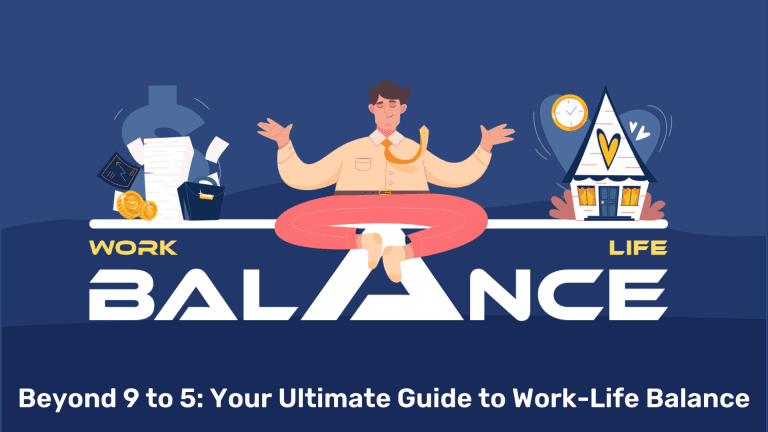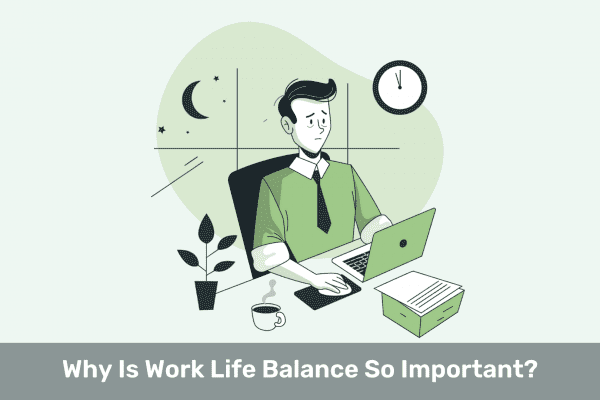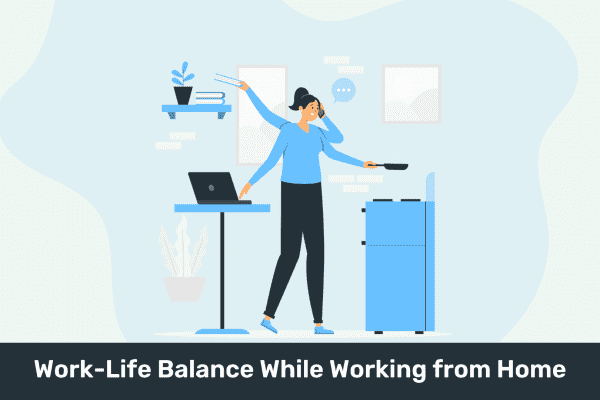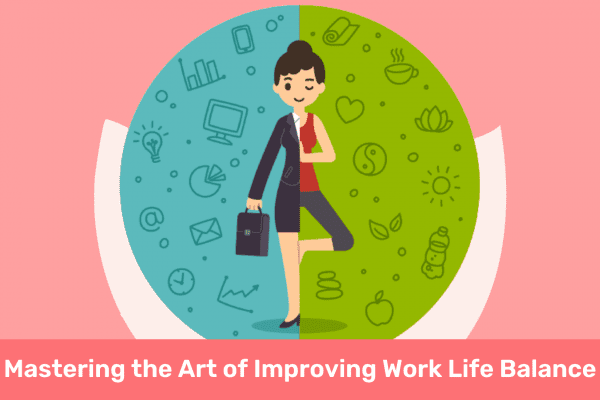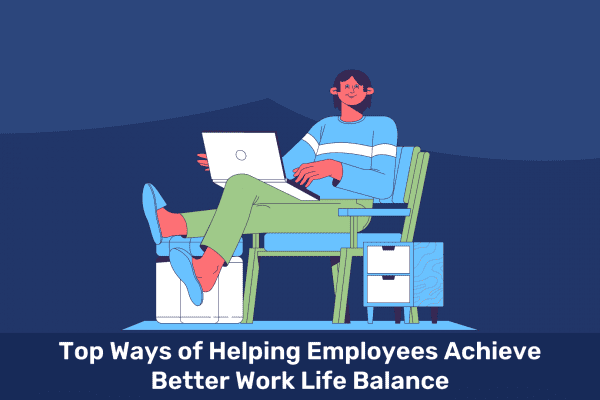Introduction
Achieving work-life balance has become an increasingly important goal in today’s fast-paced and demanding world. A well-designed daily routine can play a pivotal role in creating the desired equilibrium between work responsibilities and personal life commitments.
Biologically, we operate on 90-minute bursts of energy. This varies based on the type of work we do, but the idea is built around having a balanced routine. If you’re at a desk for long periods of time, you need to take breaks.
If you want to stay focused, you need to work on achieving work-life balance first. This means balancing every aspect of your life. At home or in the office, if you neglect any of these areas, you will feel the effects everywhere else.
Research has shown that individuals who effectively manage their daily routines are more likely to experience reduced stress, improved well-being, and increased productivity.
According to a study conducted by the American Psychological Association, maintaining work-life balance is crucial for overall mental and physical health.
The study found that individuals who struggle with work-life balance are more likely to experience symptoms of burnout, higher levels of stress, and a diminished sense of well-being. On the other hand, those who successfully integrate work and personal life through a structured daily routine report higher job satisfaction and greater life satisfaction overall.
Additionally, research from the Harvard Business School indicates that a well-designed daily routine helps individuals prioritize their time, set boundaries, and allocate dedicated blocks for work, family, self-care, and leisure activities. This intentional time management approach has been shown to enhance productivity, improve focus and concentration, and foster a healthier work-life balance.
Embarking on the journey to achieve work-life balance through a daily routine is an investment in your overall happiness, fulfillment, and long-term success. Let’s dive in and discover the transformative power of a well-designed daily routine in creating the balanced and satisfying life you deserve.
What is Work Life Balance?
We usually think about work-life balance as a trade-off between the time you spend at work and the time you spend on non-work activities you love. In an ideal world, everyone should be free to have a healthy social life with a lot of downtime to relax after they come home from the office.
However, not everyone gets this luxury these days. Many people need to work night shifts and weekends or are losing sleep because they need to reply to emails even after work.
So, it is not possible for every person to balance work and the time they give to their hobbies, friends, and family members. Like a diet, a work life balance is essential to help you stay energized and healthy in the long run.
People must use their time in various ways instead of staying put all day at a desk. We usually fall into the trap of believing that we can always be productive every second of every hour.
You may be guilty of thinking that an eight-hour day at work should equate to exactly eight hours of output. But this is never true, is it? Research has consistently shown that most employees do not produce anything beyond a certain number of hours.
But people always end up pushing themselves to make more money or make their boss happy for another day. There is a reason why “hustle culture” took off as tremendously as it did.
Many of us mistakenly believe that spending time doing nothing is an absolute waste instead of seeing it as the time to rest and recuperate.
The negative impact on your health will increase if you are a workaholic who struggles to practice self-care. You will find yourself at higher risk of fatigue, burnout, and numerous stress-related health issues.
Definition
Work-life balance refers to the equilibrium between one’s professional commitments and personal well-being. It is the conscious and intentional allocation of time, energy, and focus to both work-related responsibilities and activities that nurture personal growth, health, and relationships.
Achieving work-life balance involves harmonizing the demands of a career or job with meaningful leisure, family time, self-care, and pursuits that contribute to mental, emotional, and physical rejuvenation. Striving for work-life balance seeks to prevent burnout, enhance overall quality of life, and foster a sustainable and fulfilling lifestyle where both professional success and personal happiness coexist harmoniously.
Key characteristics of effective Work-life balance
Effective work-life balance encompasses several key characteristics that contribute to a harmonious and fulfilling lifestyle:
- Clear boundaries
Maintaining clear boundaries between work and personal life is crucial. This includes establishing designated work hours, creating a dedicated workspace, and consciously separating work-related tasks from personal activities. Setting and respecting boundaries help prevent work from encroaching on personal time and vice versa.
- Time management
Effective time management is essential to achieve work-life balance. This involves prioritizing tasks, setting realistic goals, and efficiently allocating time for different activities. By effectively managing time, individuals can ensure they have adequate time for work responsibilities as well as personal pursuits.
- Flexibility and autonomy
Having flexibility and autonomy in managing work arrangements can contribute to work-life balance. Flexible work schedules, remote work options, or the ability to adjust work hours can allow individuals to better accommodate personal commitments and achieve a healthier balance.
- Supportive work culture
A supportive work culture that values work-life balance is crucial. Organizations that prioritize employee well-being provide resources, policies, and initiatives that support work-life balance. This includes promoting work-life balance programs, encouraging open communication, and fostering a positive and inclusive work environment.
- Self-care and well-being
Prioritizing self-care and well-being is a fundamental aspect of effective work-life balance. This involves taking care of physical health through exercise, proper nutrition, and restful sleep, as well as nurturing mental and emotional well-being through relaxation, hobbies, and quality time with loved ones.
- Setting realistic expectations
Managing expectations, both from oneself and others, is essential. Setting realistic goals, communicating boundaries, and being aware of personal limitations help avoid overcommitment and excessive stress. It is important to strive for a balance that aligns with personal values, needs, and aspirations.
- Quality Family and Social Time
Individuals with balance actively engage in meaningful interactions with family and friends. They dedicate uninterrupted time to loved ones, strengthening relationships and creating lasting memories that contribute to emotional satisfaction.
- Rest and Rejuvenation
Building regular moments of rest and relaxation into daily routines and longer breaks is essential. Effective balancers understand the importance of stepping away from work to recharge, allowing them to return with renewed focus and creativity.
- Continuous Learning and Personal Growth
Balancing work and personal interests fosters continuous learning and personal development. Engaging in hobbies, pursuing passions, and acquiring new skills outside of work enhances self-esteem, creativity, and a sense of accomplishment.
Achieving work-life balance is an ongoing process that requires conscious effort, self-reflection, and continuous adjustments. It is not about achieving a perfect balance at all times but rather finding a sustainable integration that allows individuals to thrive both personally and professionally.
Benefits of Work Life balance for Employees
The average American works around 38.7 hours each week with adults between the ages of 25-54 working 40.2 hours per week in a 168-hour week. Subtract from this number 7-8 hours of sleep each night, doctor’s appointments, time with children, and commute times. This doesn’t leave employees much time to tend to the other important aspects of their lives.
Over time, this can add up to 90,000 hours of a person’s life spent working. To put it into perspective, this amounts to one-third of your life. It brings about the question “What are the benefits of work life balance for employees?”
Maintaining a work-life balance is essential for both businesses and employees alike.
-
Stress Reduction
Why is work life balance so important? For one thing, it is important to manage stress in the workplace. Stress is the silent killer and can lead to strokes, heart attacks, and heart disease, among other health problems.
In the United States, stress at work is now the fifth leading cause of death. Maintaining a work-life balance involves finding ways to reduce stress at work. One way to do this is to allow employees to choose to turn down certain assignments or delegate them to others to protect their mental and physical health.
Some workplaces have now instigated workplace health initiatives to better balance stress with physical activity either on-campus or off for remote workers. This could involve offering workday yoga classes or discounted gym memberships to help manage stress more effectively.
-
Improved Mental Health
Better options to help manage stress can lead to an overall improvement in employee mental health as well. Employees won’t feel like they have more on their plate than they can handle. Implementing physical activity throughout the day can also help with reducing stress and anxiety in the workplace and break up the day into more manageable segments.
Employees will feel more centered and focused on their day. They won’t feel so bogged down by the stressors of the day. They will also have an outlet to assist them with letting off some steam so their emotions will be better regulated.
-
Better Physical Health
Poor mental health and increased stress at work can also lead to a decline in employee physical health. To counteract these feelings, employees may engage in unhealthy eating habits such as diets high in fat and sugar and increased caffeine and alcohol intake to cope.
If employees experience a decrease in levels of stress and an improvement in their mental health, they will be more likely to make smarter health choices physically as well. Incorporating healthier workplace snack options is a great way to get employees to make good health decisions.
You can even use employee recognition software to congratulate employees on maintaining a work-life balance that involves a healthier lifestyle. You can also set wellness challenges for employees and track their progress.
-
Increase in Engagement
Many times throughout the workday, employees are present in body but not in any other way. They are merely biding their time as a seat filler until the workday ends. Employees are not committed to their job.
This is another aspect of the question “why is a work-life balance important?” in the workplace and at home. Employee burnout rates can lead to phoning it in and not being connected or motivated to do the job they are supposed to. Being able to identify the signs of burnout can help you find ways to combat a lack of engagement at work.
By providing surveys you can receive insights into improving the workplace environment. This also increases a feeling of importance and connectedness to the workplace and improves engagement as well.
-
Connectivity between Colleagues
Often, employees do not feel a sense of connectivity with one another. They view others in the workplace as adversaries and not co-workers. This can impact the work-life balance.
Many employees do not look forward to coming to work. They will often be resentful of co-workers because they feel like they spend more time with them than they do with their own family and friends.
Holding in-office and remote web events can help employees buildup better relationships with one another. If you offer incentives for attending these events, you will reach more employees who will feel more included in workplace activities. You’ll also make work feel less like work and more like a team as a result.
-
Allows Employees to Be More Present
Having an overly busy work and personal life can cloud the thought processes of employees in the workplace. When they’re not at work, they’re thinking of all that they need to do at work. When they’re at work, they’re likely too caught up in the stresses of their personal life to focus on work.
Employees need to be able to put personal thoughts aside when they are at work. Likewise, they should also be able to put work thoughts aside outside of the workplace. Having clear boundaries between work and home is important.
Implementing corporate mindfulness and meditation programs can help achieve this. Employees won’t be as frustrated with coming to work if they’re able to attain a better work-life balance and turn off these personal issues. They will be more mindful of themselves and more present in the workplace.
-
Improve Productivity
These two elements go hand in hand. Fulfilled employees are productive employees.
When their needs are being met effectively in the workplace, they will be more willing to complete the tasks in front of them in a more expedient manner. Employees with a managed work-life balance will come ready to work each day. They will take pride in a job done well.
Using employee recognition programs will also help to keep up employee motivation, which will lead to more productive employees. Those who feel acknowledged and appreciated will come in with a better attitude towards their workplace and their job. Along with a proper work-life balance, employee recognition is a key element in boosting productivity.
-
Enhances Creativity
Why is a work-life balance crucial to creativity? Giving employees ways to maintain a better work-life balance also clears the way for more creative thinking. In a given workday, the average employee can be bombarded by phone calls, emails, work chats, meetings, and presentations.
When they’re not inundated by constant demands on their time, they will be able to think more clearly. Holding 5-minute De-Stressing Sessions such as guided meditations can put the focus back on the workday. With a clearer mind frame, employees can tap into their creative powers more easily.
This means that you’ll get better results from your employees. The quality of their creative endeavors will improve.
-
Satisfied Employees
Having a greater work-life balance also leads to satisfaction in one’s job and in the workplace environment. Employees want to feel like they have more control over their job and their workspace.
It is important to have ways to guide employees throughout their workday without making them feel as if they’re being micromanaged at every point along the way. This could include incorporating an integrative work chat where employees can share their progress on a work task.
Employees should also have the authority to prioritize the assignments that require the most attention first. Employees who feel in control and empowered to do their job will have more job satisfaction. This also helps to reduce employee turnover rates.
Signs of an Unhealthy Work Life Balance
Here are the top signs to help you identify if you have an unhealthy work and life balance. Then you can take the crucial steps to improve your health.
-
You Always Feel Tired
If you constantly feel fatigued, it could be one of the most glaringly obvious signs that you are working too much daily. When you have a mountain of tasks and reminders to juggle in a single day, you will feel physically and mentally exhausted.
Since you are tired, you will also find yourself falling behind because it becomes too hard to function. Then you may risk spending even more time completing all your tasks and will risk staying up late to finish everything.
This will cause an unhealthy work life balance that will also result in you sleeping poorly.
The exhaustion will become too much, and you could struggle to get to bed or stay asleep until the alarm goes off. You may also find it challenging to switch the brain off after work.
This could significantly impact your sleep because you will never get a moment’s rest if you are constantly thinking about things at the office instead of counting sheep.
Remember that many adults need at least 7 hours of sleep each night to feel well-rested. It is the only way you will fully function properly to go back to work for the rest of the week.
Ensure you find a relaxing bedtime routine that will help you fall asleep so much faster and be more restful the next day. Cut out some screen time before bed to practice meditation.
If you keep thinking about your tasks for the next day, you should try writing them down to help clear your mind for a good night’s sleep.
-
Frequently Working Overtime
Are you working too much for too long with hardly any time off? This is one of the most significant signs of an unhealthy work life balance.
Although you can sometimes need more time to finish tasks before deadlines, you should take a step back if you are too pressured to take on more work.
Remember that working from home can also increase the risk of you staying at the computer for much longer than planned.
When you blur the separation between your work and home life, you could end up working on projects, checking emails, and doing all-nighters.
Always ensure that you are only working your assigned hours. Take the chance to break from work and spend time on yourself.
If you struggle to fit all your tasks a day before your sign-off time, you may need to manage these better. Talk to your mentor and find out ways that you can fix your to-do lists to prioritize the tasks more efficiently.
-
Feeling Irritable
Do you find that you always lose your patience with colleagues or other friends and family members? Are you yelling a lot more these days and feeling as though you have no patience left for anyone?
This is a sign of stress from working too much. If you feel angry over little things that do not deserve such attention, you might need a break from everyone because the pressure is getting too much.
It helps to take a little bit of time each day to do something you enjoy. This way, you are not always doing things for other people.
Pamper yourself and go out for a nice meal occasionally. It will be the best experience when you are not around colleagues who keep breathing down your neck.
-
Messy Personal Space
When you are overloaded with work, you may have very messy work and personal spaces. This is because you may be too tired and overworked to tidy up. Or you may have a lot of projects and paperwork strewn across your desk that you cannot manage.
Having a cluttered workspace will make you feel less productive and focused. Then you will lead to more burnout and stress if you do not keep a tidy workspace.
It helps to get letter trays to organize your paperwork into things you need urgently. When you stay clean and organized, you will feel more relaxed.
Take a few minutes daily to pick up clothes from the ground or tidy up your clutter to help your mind feel calmer. Grab some storage boxes to organize belongings and keep your home and office clutter-free.
-
Neglecting Personal Relationships
If you are working way too much, you will have so much less time to spend with the people you love. So, you should stop yourself from always looking at work emails and checking your phone.
Ensure that you always put the right amount of effort into your personal relationships to maintain a healthy work life balance. Spend quality time with loved ones with no regrets because the problems in the office will always be there.
Even if you solve everything at the office today, new problems will arise tomorrow. So, you should never give too much of yourself all at once. Try to have a family dinner in the evenings and turn your phone off to concentrate on the company.
It also helps to catch up with friends you have not seen in a while. This will make you feel less stressed and less lonely because you are reprioritizing what is important to you by improving your work life balance.
-
Dip in Productivity
A poor work-life balance affects everyone, including the company. When you are overworked, you may start to notice a dip in your quality of work.
If all of your colleagues are overworked, that’s the kind of issue that could potentially echo through the whole company.
Income might drop as a result of your less efficient work or having to work longer to correct mistakes made.
Encourage yourself to treat yourself to a 10 or 15-minute break. Going outside to get fresh air or sitting in the sun for some time can be a welcomed break from an office environment. You can also have flavored coffee pods and cookies in the break room.
Giving yourself daily or weekly goals to look forward to because it keeps you engaged in your tasks.
-
Loss of Love for the Job
Constantly feeling overworked can lead to negative feelings about your job, your superiors, and the whole mission of the company. When you lose sight of why you like your job, your work may become lackluster.
If you find yourself experiencing a loss of love for your job, it’s important to take proactive steps to address this situation. Start by reflecting on what aspects of the job used to bring you joy and fulfillment and try to reconnect with those elements.
Consider discussing your feelings with a trusted colleague or supervisor, as they might offer insights or suggest adjustments that could improve your work experience.
Remember that your well-being and job satisfaction are essential, and taking proactive steps towards positive change is a sign of self-care and personal growth.
Read More:
10 Simple Habits for Work Life Balance
Strategies/Tips for Improving Work Life Balance
Improving work life balance is essential for your well-being and overall quality of life. Here are some tips to help you achieve a healthier balance:
-
Practice Self-Compassion
You should always give yourself grace. If you’re constantly focused on having the perfect work-life balance, you’re going to give yourself more stress.
Creating the right balance isn’t always easy, and you may not get it right every day or every week, or every month. If you allow yourself to make mistakes and continue to grow, you’ll be able to support a healthier lifestyle.
-
Start Small
When it comes to setting boundaries at work, it’s best to start small. Otherwise, you could overwhelm yourself and cause yourself more stress and even burnout.
If you try to make big changes all at once, there’s a higher risk of you failing. When you start small, you give yourself more time to establish healthy habits. You are able to stick to your goals because they are manageable.
When you’re trying to reduce the lack of work-life balance, consistency is key. If you start small, you’ll give yourself more time to build up and develop consistent routines that will allow you to be successful in creating a balanced lifestyle.
If you become overwhelmed when you’re setting your goals and trying to implement changes, you’re more likely to fail. It’ll be easier to fall back into old routines and unhealthy habits. Starting with a few realistic changes will allow you to build up confidence and motivation to continue making progress and changes.
-
Get Paid Time-Off
Finding the best jobs for work-life balance isn’t always easy, but once you do, it’s imperative that you use your vacation days. Vacation days are part of your compensation.
In order to stay healthy, avoid burnout, and create a work-life balance, you must use your PTO.
You must take time off in order to recharge. You can’t do your best work if you’re constantly bogged down mentally and physically.
Unplugging from work can be really intimidating and scary for people. However, it’s necessary if you want to have a happy and healthy life.
A one or two-day staycation can be just what you need to reset and recharge. You may want to take two weeks off and visit Europe.
Either way, it’s crucial that you use the vacation days that you have. Don’t let them go to waste.
-
Eat Regular Lunch
There are little actions you can take every day to help create work-life balance. One of those things is taking your lunch.
Oftentimes, employees will eat at their desks and continue to answer emails and take phone calls. However, it’s crucial for your mental health that you get up and leave your desk during your lunch break.
Be mindful of what you’re doing with your time during your lunch.
You can take a walk, do some breathing exercises, or do a short meditation to help you become more present.
You shouldn’t have to work through your lunch break every day. It’s a bad habit that can contribute to burnout and extra stress.
-
Learn To Say No
Saying ‘no’ can be very difficult. However, it can be the most useful skill to have when you’re entering the workforce or starting a new job.
Even at the best work-life balance jobs, you need to know how to set boundaries.
It’s also equally important to know how to say ‘no’ in your personal life. Taking on too much can be extremely hindering to your health and your progress.
There may be events that you need to decline to attend in order to prioritize your mental health. You may also need to say ‘no’ to an extra assignment or to help someone else on their project to keep yourself healthy.
Before taking on other responsibilities in your personal or professional, evaluate the tasks you already have and make a thoughtful decision.
-
Interact and Communicate
Communication is crucial when you’re creating a healthy lifestyle. You need to talk to your coworkers, your bosses, your family members, and friends. Having a support system can make work-life balance much easier.
You can also gain a lot of knowledge from others. You never know what advice or tools the people around you have to offer. They may be able to help you establish a healthy routine.
-
Manage Your Time
A good way to relieve pressure on yourself at work is to master time management. When we don’t work in an efficient way, it can create more work for us and things can take longer than expected.
Failing to complete things on time will eat into your free time, so it’s essential that you get a hang of it. So to help you, here are the best ways to improve your time management.
- Set Clear Goals
- Prioritize Tasks
- Planning and Scheduling
- Take a Break!
-
Stress Management
It may not always be possible to reduce your stress in the workplace directly. There may be a big project deadline or a colleague is off sick and those are things that you cannot avoid.
It is in these situations that learning to manage your stress will be vital. Even if you only have limited free time, there are some key factors that can help you to maximize your downtime.
Exercise
Maintain a regular exercise routine, as this is important for health and well-being. Even those with a busy schedule can find 30 minutes to an hour to fit in raising their heart rate!
Try to find classes that slot into your work hours, or integrate more walking into your commute. There are lots of options to be more active throughout the day, so get creative.
Activities You Love
Don’t compromise on doing the things that you enjoy. Having hobbies is a great way to lead a fun and balanced life.
They can give you a creative and social outlet, and a way to switch off from thinking about work. This will help you manage your stress levels and make you feel great!
Quality Time
One of the biggest problems of a poor work-life balance is that it sucks up time spent with loved ones. This can be a huge obstacle if you are trying to overcome stress from the workplace.
Our family and friends are key to providing emotional support during difficult periods. Find space in your week to spend time with loved ones to share quality time together.
Make sure you unplug during these times. That way you aren’t tempted to take calls or check emails.
Conclusion
In the hustle and bustle of modern life, achieving a harmonious work-life balance has become both a challenge and a necessity. Juggling professional commitments and personal aspirations can sometimes feel like walking a tightrope, but the rewards of finding equilibrium are immense.
The problems associated with an imbalance are evident: burnout, strained relationships, and a sense of being perpetually stretched thin. However, the benefits of a well-balanced life are equally remarkable: enhanced mental and physical well-being, improved job satisfaction, and the ability to relish moments with loved ones without the burden of unchecked stress.
Strategies for improvement lie within our grasp. Learning to set boundaries, prioritizing self-care, and adopting efficient time management techniques can pave the way to a more fulfilling lifestyle. Remember, it’s about quality over quantity – making every moment count in both professional and personal spheres.
As you embark on this journey, consider the invaluable assistance that Woliba offers. Our tailored resources, wellness insights, and expert guidance can empower you to navigate the intricate dance of work and life, transforming the challenge of balance into a triumph of well-being.
Ready to embrace a life where work and personal pursuits harmonize seamlessly? Contact us and take the first step toward a more fulfilling work-life balance. Your well-being is our priority, and we’re here to help you find your stride amidst life’s many demands.

